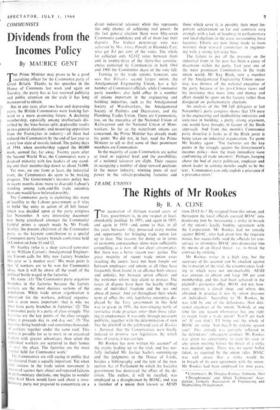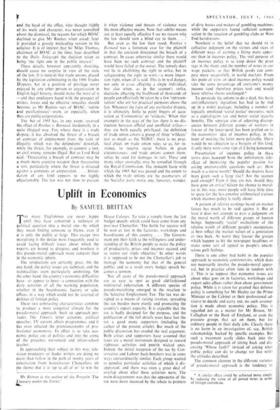The Rights of Mr Rookes
TRADE UNIONS By R. A. CLINE THE accusation of thirteen wasted years of Tory government is, in one respect at least, abundantly justified. In 1951, and again in 1955, and again in 1959—and, come to that, in all the years between—they possessed every motive and opportunity for bringing trade union law up to date. The reasons for doing so in terms of economic consequences alone were sufficiently compelling, as is now all too clear; circumspice. But there was a better reason too: justice The great majority of recent trade union cases reaching the courts have not been fought out between employers and unions at all (they have frequently been found in an alliance both uneasy and unholy), but between union officials and the workmen whom they claim to protect. The issues in dispute have been the hardly trifling ones of individual freedom and the use and abuse of power. And yet throughout their whole term of office the only legislative enterprise dis- played by the Tory government in this field was to grasp, in 1956. the non-stinging nettle of restrictive trade practices oilier than those relat- ing to employment. It was only through persistent publicity, together with the determination of men like the plaintiff in the celebrated case of Rookes v. Barnard, that the Conservatives were finally induced to promise new legislation. By which time, of course, it was too late.
Mr Rookes has now written his account* of the events leading up to the trial, and has use- fully included Mr Justice Sachs's summing-up and the judgments in the House of Lords, besides a bibliography and the text of the two- section Act of Parliament by which the Socialist government has destroyed the effect of the de- cision. The author, it will be recalled, was employed as a draughtsman by BOAC, and was a member of a union then known as AESD (now DATA). -f He resigned from this union, and thereupon the local officials coerced BOAC into dismissing him by threatening a strike in breach of the union's legally binding agreement with the Corporation. Mr Rookes had no remedy against BOAC, who had given hint the requisite notice, but successfully sued the officials for con- spiracy to intimidate BOAC into dismissing him by means of an illegal threat: i.e., to break the contract by striking.
Mr Rookes writes in a high key, but the accuracy of his account can he checked against the transcript of the trial, the circumstances lea& ing to which were not unremarkable. AESD was anxious to obtain and keep 100 per cent membership, and this had been achieved in the plaintiff's particular office. BOAC did not, how- ever, operate a closed shop. and where this obtained in practice it was by union pressure on individuals. According to Mr Rookes, he was told by one of the defendants, then divi- sional organiser of the union. 'Nobody at any time for any reason whatsoever has any right to resign from a trade union! You'll get back in! If you don't, I'll brine out the whole of BOAC on strike. And they'll he striking against you!' This attitude was certainly reflected in the defendants' subsequent conduct. Mr Rookes was given no opportunity to state his case at any union meeting before the threat of a strike was decided upon. There was no secret ballot taken, as required by the union rules. BOAC was well aware that a strike would be in breach of its own agreement with the union. Mr Rookes had been employed for nine years, CONSPIRACY. By Douglas Rookes. (Johnson. 30s.) t Draughtsmens' and Allied Technicians' Asso- ciation; formerly Association of Engineering and Shipbuilding Draughtsmen. and the head of the office, who thought highly of his work and character, was never consulted about the dismissal, the reasons for which BOAC declined to give Mr Rookes when asked; later it provided a grossly misleading version to his solicitor. It is of interest that Sir 'Miles Thomas, chairman of BOAC at the time, later described to the Daily Telegraph the decision taken as being 'the right one in the public interest.'
These details, however apparently shocking, should cause no surprise in view of the state of the law. It is natural that trade unions. placed by the legislation culminating in the 1906 Trades Disputes Act in a position of privilege never enjoyed by any other person or organisation in English legal history. should make the most of it —and that employers faced with the prospect of strikes, losses and no effective remedies should become, as Mr Rookes says of BOAC. 'supine and pusillanimous'—even, or especially, when they are public corporations.
The Act of 1965 has, in any event. reversed the effect of Rookes v. Barnard. incidentally in a quite illogical way. For, where there is a trade dispute, it has absolved the threat of a breach of contract of employment from the taint of illegality which was the defendants' downfall, while the threat, for example, to commit a tort, or civil wrong. remains illegal. But as Lord Reid said, 'Threatening a breach of contract may be a much more coercive weapon than threatening a tort, particularly where the threat is directed against a company or corporation. . . Intimi- dation of any kind appears to me highly objectionable. The law was not slow to prevent
it when violence and threats of violence were the most effective means. Now that subtler means are at least equally effective I see no reason why the law should turn a blind eye to them. . .
But even as the law then stood, Rookes v Barnard was a fortunate case for the plaintiff in that the coercion threatened the breach of a contract. In cases otherwise similar there would have been no such contract and the plaintiff would have failed at the outset. The remedy does not lie in abolishing the right to strike, but in safeguarding the right to work—a more impor- tant right, when all is said. This is in real danger, not only in cases affecting a single individual, but also when, as in the seamen's strike, decisions affecting the livelihood of thousands of people can effectively be taken by a few 'represen- tatives' who are for practical purposes above the law. Whatever the facts of any particular dispute, it is ultimately futile to point fingers of accu- sation at 'Communists' or 'wildcats.' When (for example) in the eyes of the law there is no dis- tinction between official and unofficial strikes— they are both equally privileged; the definition of trade union covers a group of three 'wildcats' just as much as the TGWU; there is no prac- tical check on trade union rules so as. for in- stance, to require secret ballots in given circumstances; and trade unions cannot them- selves be sued for damages in tort. These and many other anomalies may be remedied through the Royal Commission. The indecent haste with which the 1965 Act was passed and the extent to which the trade unions are the paymasters of the Socialist party make one, however, wonder.































 Previous page
Previous page